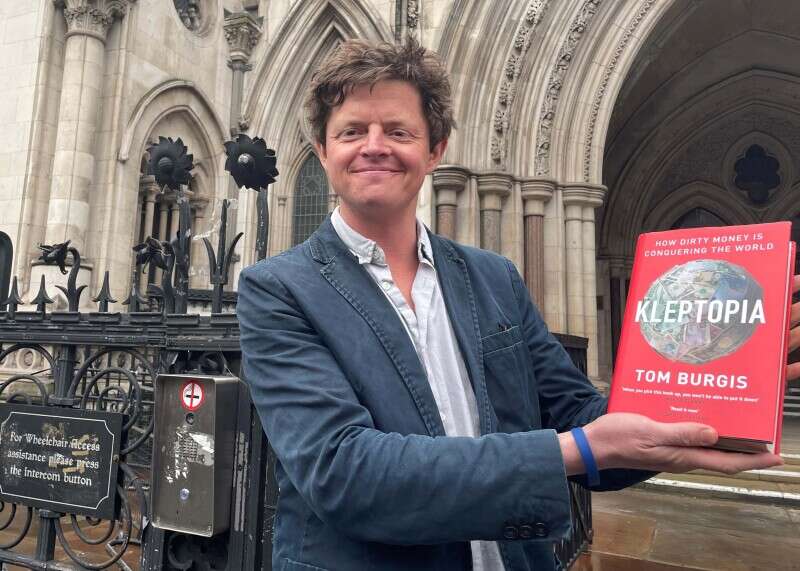
National newspaper editors from across the political spectrum have urged the UK Government to crack down on intimidating legal tactics known as SLAPPs.
SLAPPs, which stands for Strategic Lawsuits Against Public Participation, refer to lawsuits targeting journalists, news organisations, whistleblowers or other groups putting out information in the public interest that are deemed meritless and being used to bully them into silence, including by dropping a story.
Libel, copyright, data protection and misuse of private information laws are all increasingly abused as SLAPPs, critics of the practice say. The cases that get heard in court are said to be just the “tip of the iceberg” as many succeed in silencing journalists through the fear of racking up substantial costs.
An open letter from many journalists and lawyers to members of the Government, including Justice Secretary Dominic Raab and Culture Secretary Michelle Donelan, has asked them to adopt an “oven-ready” solution published this year.
This is a model anti-SLAPP law created by the UK Anti-SLAPP Coalition that would allow courts to swiftly dispose of cases deemed to be SLAPPs and hand out penalties that would act as a deterrence and ultimately provide full compensation for those targeted, stopping claimants from being able to “weaponise” the legal system.
Among the 74 signatories are the editors of almost all of the UK’s national newspapers: the Times, Sunday Times, Sun, Daily Mail, Guardian, Observer, Mirror, Express, i, Financial Times and Telegraph.
Recent high-profile SLAPP cases have included Russian oligarchs such as then-Chelsea FC owner Roman Abramovich targeting former FT Moscow correspondent Catherine Belton over her book Putin’s People (ultimately settled), a Kazakh mining giant’s case against journalist Tom Burgis, the FT and his book publisher Harper Collins that was thrown out by a judge, and Observer journalist Carole Cadwalladr’s win using the public interest defence after being sued by Brexit donor Arron Banks. All three have signed the open letter.
Scroll down for the complete list of 74 signatories
Burgis, whose book Kleptopia contained the relevant allegations, told the Anti-SLAPP Conference hosted by the Foreign Policy Centre and Justice for Journalists Foundation in London on Monday that lawyers representing claimants targeting the media have become increasingly powerful, resulting in stories being spiked “every day because the journalists are too scared to do them”.
Lawyers ‘as powerful as Fleet Street editors’ in editorial decisions
“Their editors are too scared to run them. And because London law firms whose senior partners wield power equivalent to that of a Fleet Street editor in deciding what we get to read and what we don’t get to read are making just those decisions every day on behalf of clients whose interests are completely inimical to democracy.”

Burgis also suggested he would have benefited from a mechanism to throw out SLAPP cases because “any independent observer could have said on day one this case is absolute bollocks. It was ludicrous.
“The central allegation was that I had written that a holding company, essentially a piece of paper, had murdered some people. My six-year-old knows that that’s rubbish. And yet Harper Collins is still down significant amounts of money even though we got awarded all our costs, amounts of money that’s equivalent to books, valuable books, that could have been published and the company continues to operate around the world more or less unchallenged.”
Other editors to have thrown their support behind the model law include Prospect Magazine’s Alan Rusbridger, Private Eye’s Ian Hislop, The Economist’s Zanny Minton Beddoes, Reuters’ Alessandra Galloni, Bloomberg’s John Micklethwait, The Bureau of Investigative Journalism’s Rozina Breen and Open Democracy’s Peter Geoghegan.
TBIJ, Open Democracy and The Telegraph are currently facing a legal threat from an organisation linked to Kazakhstan’s former dictator Nursultan Nazarbayev over stories about his alleged use of a UK company to protect his assets. Lawyers on behalf of the company claimed the stories had caused it financial loss, according to Open Democracy.
Labour MP Liam Byrne last week led an attempt to add an amendment to the Economic Crime Bill designed to allow judges to dismiss SLAPP cases, but it was rejected by the Government which promised to deal with SLAPPs earlier this year. However it has been criticised for moving too slowly.
The new letter to the Government pointed out progress against SLAPPs is being made in the EU and US and the Government must “ensure that the UK can keep pace and contribute to this global movement to protect against SLAPPs”. “It is crucial momentum is not lost,” it said.
[Read more: UK is SLAPP tourism capital of Europe but scale of ‘iceberg problem’ not fully known]
Rupert Cowper-Coles, a partner at the law firm RPC and one of several lawyers to sign the letter, said his employer is one of a handful in London that defends the media and never acts against them.
‘Brave’ news organisations jeopardise staff and legal budgets to fight
Speaking at the Anti-SLAPP Conference, Cowper-Coles said: “I’d say for every one of me there’s probably eight or nine claimant solicitors or lawyers – this is big business, the reputation management business.”
He said the proposed Government reforms are “desperately needed” as the industry is currently in a “depressive situation where brave organisations – media organisations, NGOs and journalists – are having to decide between the principle of fighting to get a story out or facing the commercial reality that they might be jeopardising their entire legal budget, the employment of staff or, in the case of freelances, their house or their retirement on a story.
“That’s the reality of what we’re often having to advise our clients when they’re facing SLAPP cases.”
He said that during the Government’s recent consultation process on the issue, there was “almost no recognition that there was any issue from private practice solicitors and counsel from the other side of the divide”, adding it was “quite remarkable how stark the division is”.
Cowper-Coles added that a statutory dismissal mechanism for cases deemed to be SLAPPs was “desperately needed” as he has looked at common law ways of doing so and calculated it would have proved “desperately expensive and highly risky”. Developing the appropriate case law would take decades, he added.
It is also “absolutely crucial” to deal with costs, he added, as litigation has become so expensive. He said a cost budget to take a libel or privacy case to trial might have been £200,000 to £300,000 ten years ago but “I don’t see cost budgets going in for less than £1m these days”.
Guardian editor Katharine Viner said in a statement: “The abuse of the UK legal system by powerful individuals and vested interests to intimidate journalists should be a subject of national shame. The British government has taken this issue seriously for the first time in a generation, and this model law provides a clear opportunity for the government to act on its good intentions to pass legislation without delay.”
A Ministry of Justice spokesperson said: “This issue is of the utmost importance and is being given urgent consideration. We intend to introduce legislative proposals as soon as possible.”
Full list of signatories to media anti-SLAPP letter (as of 29 November):
- John Witherow, Chairman, Times Media
- Emma Tucker, Editor, The Sunday Times
- Tony Gallagher, Editor, The Times
- Victoria Newton, Editor-in-Chief, The Sun
- Paul Dacre, Editor-in-Chief, DMG media
- Ted Verity, Editor, The Daily Mail
- Katharine Viner, Editor-in-Chief, The Guardian
- Paul Webster, Editor, The Observer
- Alison Phillips, Editor, The Mirror
- Oliver Duff, Editor-in-Chief, i
- Roula Khalaf, Editor, The Financial Times
- Chris Evans, Editor, The Telegraph
- Alan Rusbridger, Editor, Prospect Magazine
- Ian Hislop, Editor, Private Eye
- Zanny Minton Beddoes, Editor-in-Chief, The Economist
- Alessandra Galloni, Editor-in-Chief, Reuters News Agency
- John Micklethwait, Editor-in-Chief, Bloomberg
- Drew Sullivan, Co-founder and Publisher, Organised Crime and Corruption Reporting Project (OCCRP)
- Paul Radu, Co-founder and Chief of Innovation, OCCRP
- Rozina Breen, CEO, The Bureau of Investigative Journalism (TBIJ)
- Peter Geoghegan, Editor-in-Chief and CEO, openDemocracy
- Nick Mathiason, Co-founder and Co-director, Finance Uncovered
- Gerard Ryle, Director of the International Consortium of Investigative Journalists (ICIJ)
- David Kaplan, Executive Director, Global Investigative Journalism Network (GIJN)
- Michelle Stanistreet, General Secretary, National Union of Journalists (NUJ)
- Dawn Alford, Executive Director, Society of Editors
- Sayra Tekin, Director of Legal, News Media Association (NMA)
- Sarah Baxter, Director, Marie Colvin Center for International Reporting
- Paul Murphy, Head of Investigations, Financial Times
- Rachel Oldroyd, Deputy Investigations Editor, The Guardian
- Carole Cadwalladr, journalist, The Observer
- Catherine Belton, journalist and author of the book, Putin’s People: How the KGB took back Russia and then took on the west
- Tom Burgis, reporter and author of the book, Kleptopia: How dirty money is conquering the world
- Oliver Bullough, Journalist and author
- Clare Rewcastle Brown, investigative journalist and founder of The Sarawak Report
- Richard Brooks, journalist, Private Eye
- Matthew Caruana Galizia, Director of The Daphne Caruana Galizia Foundation
- Mark Stephens CBE, Partner at Howard Kennedy LLP
- Caroline Kean, Consultant Partner, Wiggin
- Matthew Jury, Managing Partner, McCue Jury and Partners
- David Price KC
- Rupert Cowper-Coles, Partner at RPC
- Conor McCarthy, Barrister, Monckton Chambers
- Pia Sarma, Editorial Legal Director, Times Newspapers Ltd
- Gill Phillips, Director of Editorial Legal Services, Guardian News & Media
- Lisa Webb, Senior Lawyer, Which?
- Juliette Garside, Deputy Business Editor, The Guardian and The Observer
- Alexander Papachristou, Executive Director of the Cyrus R. Vance Center for International Justice
- José Borghino, Secretary General, International Publishers Association
- Dan Conway, CEO, Publishers Association
- Arabella Pike, Publishing Director, HarperCollins Publishers
- Joanna Prior, CEO of Macmillan Publishers International Limited
- Meirion Jones, Editor, TBIJ
- Emily Wilson, Bureau Local Editor, TBIJ
- James Ball, Global Editor, TBIJ
- Franz Wild, Enablers Editor, TBIJ
- James Lee, Chair of the Board, TBIJ
- Stewart Kirkpatrick, Head of Impact, openDemocracy
- Moira Sleight, Editor, the Methodist Recorder
- Paul Caruana Galizia, reporter, Tortoise
- Tom Bergin, journalist and author
- James Nixey, Director, Russia and Eurasia Programme, Chatham House
- Edward Lucas, Author, European and transatlantic security consultant and fellow at the Center for European Policy Analysis (CEPA)
- Sean O’Neill, Senior Writer, The Times
- Dr Peter Coe, Associate Professor in Law, Birmingham Law School, University of Birmingham
- Alex Wilson, Partner at RPC
- George Greenwood, Investigations Reporter, The Times
- Simon Bowers, Investigations Editor, Finance Uncovered
- John Heathershaw, Professor of International Relations, University of Exeter
- Tena Prelec, Research Fellow, DPIR, University of Oxford
- Thomas Mayne, Research Fellow, DPIR, University of Oxford
- Jodie Ginsberg, President, Committee to Protect Journalists
- Dr Julie Macfarlane, Co-Founder, Can’t Buy My Silence campaign to ban the misuse of NDAs
- Zelda Perkins, Co-Founder, Can’t Buy My Silence campaign to ban the misuse of NDAs
Email pged@pressgazette.co.uk to point out mistakes, provide story tips or send in a letter for publication on our "Letters Page" blog
